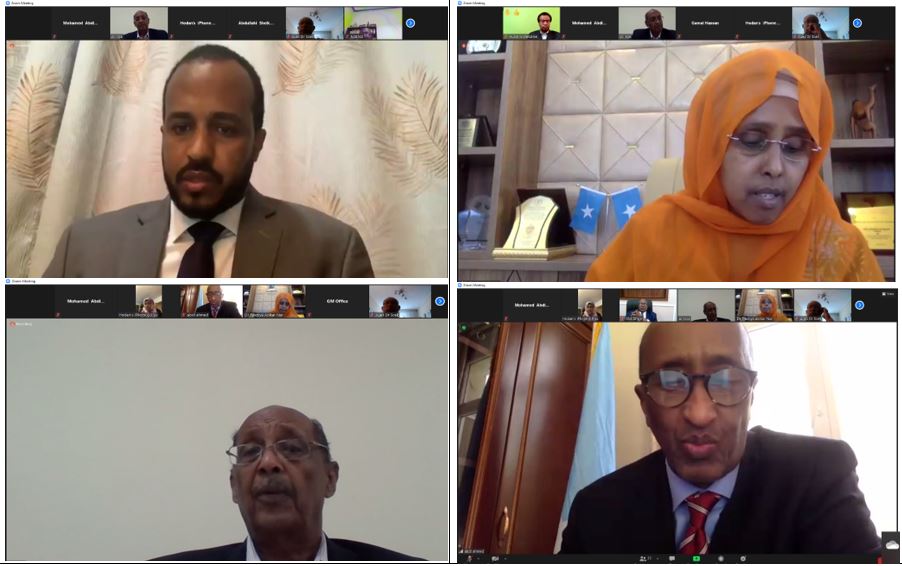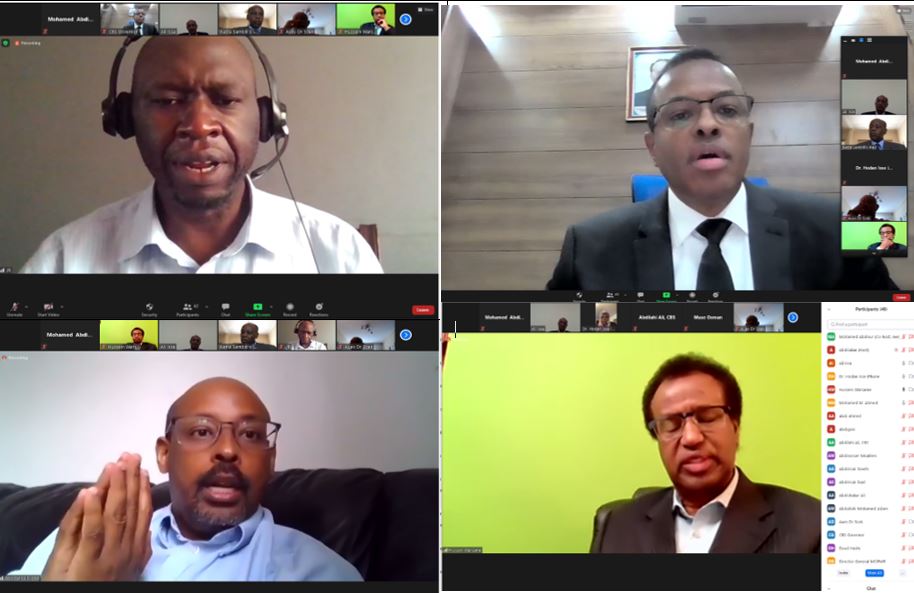The Virtual event hosted more than 50 participants including Federal government Officials, Federal Member States (FMSs) , International partners, civil society, private sectors, academia and other distinguished guests.
On 20th June 2021, The National economic council held the virtual policy forum via Zoom Platform, in Mogadishu , Somalia. The purpose of the Policy Forum was to present and discuss the assessment of “Health and Economic Impact of Covid-19 “in Somalia. The study was based on a rapid assessment by the Somali National Economic Advisors of the NEC, regarding the COVID-19 impact on the health and socio-economic developments and prospects of the nation. The process of carrying out the assessment involved extensive interactions with ministries and other government agencies, whose valuable cooperation was indispensable.
In view of limitations on the quality of data on the country’s health, economic and social indicators, the efforts of the many institutions that availed data were highly appreciated and any remaining shortcomings on the quality of evidence provided would not be attributed to NEC or other cooperating institutions.

The forum was introduced by the Executive Director of the NEC Dr. Ali Issa, and welcomed distinguished guests and participants. Dr. Ali Issa highlighted the severe threat Somalia has faced from Covid-19 pandemic, the impact of the global pandemic on the fragile economy and healthcare institutions, and its consequences and setbacks. The chair gave the floor to HE. Gamal Hassan, the Minister for Planning, Investment and Economic Development. Minister Gamal began with the opening session of the policy forum, and focused mainly on the effect of the covid-19 and presented a statistic report recorded in the country of Covid cases. Dr. Fawzia Abikar, Minister of health delivered her speech also at the opening session of the Policy Forum. Dr. Fawzia Abikar discussed mainly on the impact of the Covid19 in the country’s overall economic performance and strategies put in place to tackle the pandemic while presenting data on the Covid-19 cases in the country and the preparedness of the health institutions for a third wave. Additionally, HE. Abdi Sheikh Ahmed, Federal Minister for Posts and Telecommunications Ministry briefly highlighted the importance of technology and the role it plays in countering the spread of the Corona-virus across the nation while stressing on his Minister’s efforts in the technology sector. The Minister finally applauded the Virtual Policy Forum and the efforts of NEC to address the pressing economic and health problems faced by the country.
Dr. Aues Scek presented the objective of the Health assessment which was to generate data and evidence based information that can be used by the policy makers to design relevant policies and strategies that are concrete, realistic and implementable. Prof Nehmiah Ngeno addressed the pertinent issues on health assessment, highlighting that the Federal Government spends very limited budget on health and is dependent on donor financing. He also presented a survey on access to health, and the result showed a decline in the access to health due to poverty. He also mentioned that according to Somalia’s health demographic survey, 43% spent less than 50$ on health.

Dr. Ali Issa and Dr. Peter Middle brook presented on the economic impact and highlighted the crisis Covid 19 has brought to the economy. Covid-19 impact on Somalia has been far lower than most advanced economies . That maybe because they are under important. Dr Edward Sambili presented a study finding on remittance inflow impact. The objectives of the study was to understand the Hawala system, and also to access the Severity of covid-19 pandemic on the remittance and the areas that were impacted along the remittance supply chain. Based on the Preliminary data , the extensive empirical data showed the remittance sector to be the highlight during the pandemic. The overall feedback was positive, thanking the presenters for their statistic reports they presented. The panelists added also that Health is a big issue in Somalia and needs a sufficient data to address it. The participants concluded the discussion and suggested some recommendations which included:
- Relocate more resources to the health sector.
- Government should discuss with donors, and humanitarians to channel more of the donor. funds to the health sector through the government which will relocate more resources. iii. Since the private sector is the major provider of the health service , recommendation on legislation to be acted , to govern these sectors and to ensure the private sector provides good services
The participants discussed the impact of Covid 19 on the economy, where 2020 was first time the budget was included for the social sector of health and education.
Some of the Suggestion included the introducing of National execution system, with the help of ministry of planning, Investment and Economic Development, a direct system where all the assistance go through the budget and the Central bank .This way it will give power and authority to control whatever is coming in the country. The discussants and panelists discussed the financial sectors progress, although Somalia’s financial sector has been in need of a Reform way before the pandemic hit. The top priority of the central bank of Somalia is to play a leading role in reforming the sector. This Reform includes the restructure of the CBS itself. The CBS also highlighted that Somali diasporas have been known to increase the remittance in difficult times.
The participants raised their concerns about the barrier at an international level which makes it difficult to do business transactions for the financial service providers in Somalia. The CBS pointed out that the Hawala system is an informal traditional ,Untrusted based way of doing business which carries negative impact. The word Hawala does not do justice to the financial sector , because it does not reflect the nature of the service provider. The use of such term shows a negative perception on Somalia’s financial sector. The participants suggested 3 indirect ways to access Remittance. They are the following.
- Looking at the liquidity ratio of the banking sector.
- Balance of payment of data of the source countries
- Looking at the export sector of Somalia
The Virtual Policy Forum ended as scheduled and hence Dr. Ali Issa delivered his closing speech thanking the participants for their valuable insights and discussions. He underlined the importance of organizing such forums and platforms to discuss the future of Somalia and the pressing issues that require the government’s attention to fast track the country’s economic recovery and to tackle impact of pandemics on the country’s economy and health institutions.
